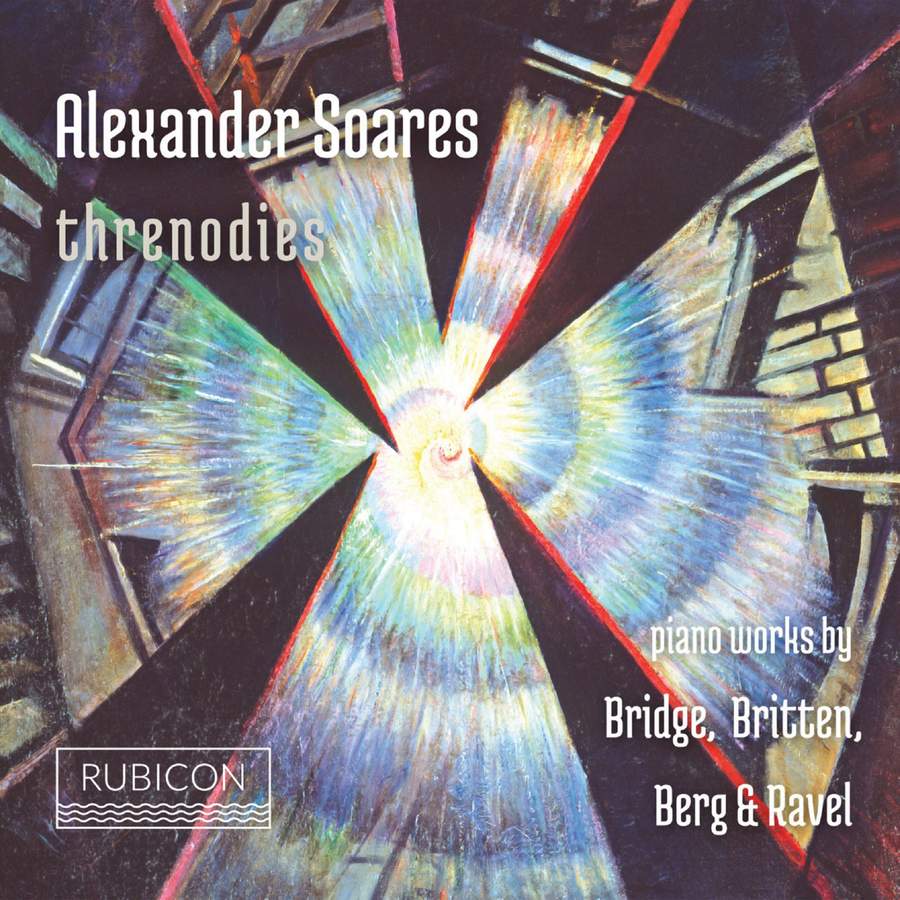Alexander Soares: Threnodies
View record and artist detailsRecord and Artist Details
Genre:
Instrumental
Label: Rubicon
Magazine Review Date: 10/2021
Media Format: CD or Download
Media Runtime: 75
Mastering:
DDD
Catalogue Number: RCD1068

Tracks:
| Composition | Artist Credit |
|---|---|
| Piano Sonata |
Frank Bridge, Composer
Alexander Soares, Piano |
| (12) Variations on a Theme |
Benjamin Britten, Composer
Alexander Soares, Piano |
| Sonata for Piano |
Alban Berg, Composer
Alexander Soares, Piano |
| (Le) Tombeau de Couperin |
Maurice Ravel, Composer
Alexander Soares, Piano |
Author: Harriet Smith
Alexander Soares’s debut recital ‘Notations & Sketches’ much impressed Richard Whitehouse (5/19). This second album, ‘Threnodies’, is similarly based around a theme, that of the devastation wreaked by the First World War. At its centre is the large-scale Piano Sonata by Bridge (1921 24), composed after the pacifist had experienced the deaths of a number of friends and colleagues. It breaks with Bridge’s pre-war tonal language and Soares is clearly in tune with the work’s anguish, making much of the opening’s high-lying bell-like sonorities and unsettling deep chords. As the tempo hots up to Allegro energico he goes at it with a will, alive to the work’s gravelly dynamism and surmounting Bridge’s often considerable technical demands with an easy virtuosity. The second movement swaps action for reflection and here there are places where Peter Jacobs and Kathryn Stott find a greater sense of mystery. In the finale, which returns us to a mood of urgency and disquiet, Soares is again in his element, conveying the immensity of the emotional journey in the piece’s closing moments.
The remaining music, though, is more of a mixed bag. Although the constituent pieces of Ravel’s Le tombeau de Couperin are dedicated to lost friends, it is a largely light-hearted suite. Yet it’s as if Soares wanted to imbue the music with an elegiac feel, often selecting tempos that are rather slow. The initial Prélude, for instance, is a touch dogmatic, certainly compared to Chamayou and Osborne, while the Fugue takes shape only tentatively. In the Forlane he is much dreamier than Bavouzet’s teasing manner, while his Rigaudon is again overly cautious, losing the inherent contrast of the haunting middle section. In the Menuet he is somewhat plain, finding little of the character that Osborne, Bavouzet and Chamayou reveal, and the delicious harmonic side-slip at the end counts for relatively little. I hoped for more élan in the Toccata but again it sounds too reined in, as if he’s afraid to let himself go interpretatively.
That feeling unfortunately continues in the Berg Sonata, which is a model of textural and structural clarity. But overall it’s too cool and fails to sear the soul in the way that artists as different as Mitsuko Uchida and Andreas Haefliger do. They are alive to its extremes of moods and, at the close, both convey the sense of all emotion spent.
Bridge’s student Britten is the final featured composer, and Soares has unearthed a real rarity – an incomplete set of variations intended for the 1966 Leeds Piano Competition, to which the indefatigable Colin Matthews has lent a helping hand. Though this is hardly top-drawer Britten, Soares’s commitment is not in doubt and the toccata-like brilliance of the last variation is suitably dazzling.
Discover the world's largest classical music catalogue with Presto Music.

Gramophone Digital Club
- Digital Edition
- Digital Archive
- Reviews Database
- Full website access
From £8.75 / month
Subscribe
Gramophone Full Club
- Print Edition
- Digital Edition
- Digital Archive
- Reviews Database
- Full website access
From £11.00 / month
Subscribe
If you are a library, university or other organisation that would be interested in an institutional subscription to Gramophone please click here for further information.




